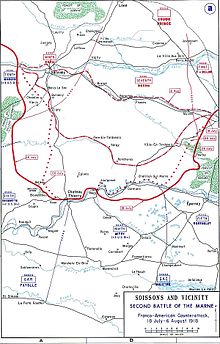Battle of Belleau Wood
A third offensive launched in May against the French between Soissons and Reims, known as the Third Battle of the Aisne, saw the Germans reach the north bank of the Marne River at Château-Thierry, 95 kilometres (59 mi) from Paris, on 27 May.
[4]: 107 On the evening of 1 June, German forces punched a hole in the French lines to the left of the Marines' position.
In the afternoon of 3 June, German infantry attacked the Marine positions through the grain fields with bayonets fixed.
[4]: 108 Having suffered heavy casualties, the Germans dug in along a defensive line from Hill 204, just east of Vaux, to Le Thiolet on the Paris-Metz Highway and northward through Belleau Wood to Torcy.
As a consequence, they missed a regiment of German infantry dug in, with a network of machine gun nests and artillery.
Also cited for advancing through enemy fire during the counter-attack was Marine Gunner Henry Hulbert who was awarded the Distinguished Service Cross.
They gathered valuable information showing the Germans were consolidating machine gun positions and bringing in artillery.
One of the most famous quotations in Marine Corps history came during the initial step-off for the battle when First Sergeant Dan Daly, a recipient of two Medals of Honor who had served in the Philippines, Santo Domingo, Haiti, Peking, and Vera Cruz, prompted his men of the 73rd Machine Gun Company forward with the words: "Come on, you sons of bitches.
On his right, the Marines of Major Sibley's 3/6 Battalion swept into the southern end of Belleau Wood and encountered heavy machine gun fire, sharpshooters, and barbed wire.
[4]: 112 On 9 June, an enormous American and French barrage devastated Belleau Wood, turning the formerly attractive hunting preserve into a jungle of shattered trees.
[10]: 17 Next, Wise's 2nd Battalion, 5th Marines was ordered to attack the woods from the west, while Hughes continued his advance from the south.
A German private, whose company had 30 men left out of 120, wrote "We have Americans opposite us who are terribly reckless fellows.
[10] On that day, Major Shearer submitted a report simply stating, "Woods now U.S. Marine Corps entirely",[11]: 3 ending one of the bloodiest and most ferocious battles U.S. forces would fight in the war.
Regardless of the term's origin, ten years after the battle, Lieutenant Colonel Ernst Otto, from the Historical Section of the German Army, wrote of the Marine Corps: "Their fiery advance and great tenacity were well recognized by their opponents.
Composed by then Second Leader Taylor Branson, who later led the Marine Band from 1927 to 1940, it was dedicated to Army Major General James.
In his address, he summed up the future of the site: Now and then, a veteran, for the brief span that we still survive, will come here to live again the brave days of that distant June.
[5][17]White crosses and Stars of David mark 2,289 graves, 250 for unknown service members, and the names of 1,060 missing men adorn the wall of a memorial chapel.
[5][18] On 18 November 1955, a black marble monolith with a bronze relief of a fighting Marine was dedicated at a road clearing near the site of the battle.
Joyce was posthumously awarded the Croix de Guerre with bronze star for his actions at Belleau Wood: "A most audacious liaison agent.
Killed on the night of June 24, 1918, after having on five successive occasions carried messages to the company post of command under violent fire of machine guns and artillery."
The first USS Belleau Wood (CVL-24) was a light aircraft carrier active during World War II in the Pacific Theater, from 1943 to 1945.
A shortened version of Lloyd Williams' famous quote is the basis for the motto the 2nd Battalion, 5th Marines, his unit during the battle.
Williams himself has been honored with a building on the campus of his alma mater Virginia Polytechnic Institute and State University named in remembrance of him.









